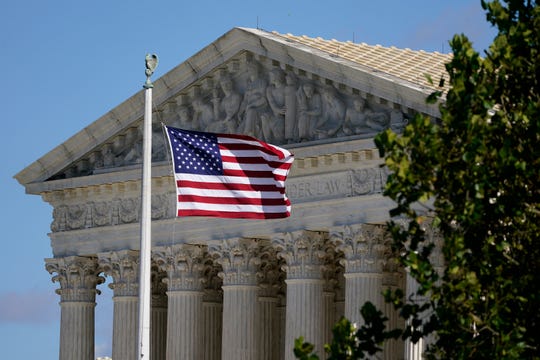Supreme Court rules against immigrant who was denied chance to make his case against deportation
WASHINGTON – The Supreme Court ruled Thursday against an immigrant who has lived in the country illegally for 25 years and who asserted he was wrongfully denied a chance to convince a judge his deportation would cause unusual hardship on his son, who is a U.S. citizen.
Associate Justice Neil Gorsuch wrote the majority opinion and was joined by four of the court’s conservatives. The high court found that Clemente Pereida did not meet the burden required to show he should have been allowed to present his case to an immigration judge.
“Individuals seeking relief from a lawful removal order shoulder a heavy burden,” Gorsuch wrote. “Mr. Pereida failed to carry that burden.”
Although Pereida’s journey through the U.S. legal system began before President Donald Trump’s administration, the case is one of several to come before the court at a time when federal immigration policies are likely to change under President Joe Biden.
The court announced last month it would take up a case about a Trump regulation allowing federal officials to deny green cards and visas to immigrants if they believe the recipients will receive public benefits like food stamps, Medicaid or housing vouchers. Another case, argued last month, addresses what happens when a migrant requesting asylum doesn’t convince an immigration judge of his or her case but that judge also doesn’t make a specific finding questioning their credibility.
Pereida arrived in the USA from Mexico in 1995 and faced deportation in 2009. He applied to cancel his removal but was denied review by an immigration judge because of a misdemeanor charge of attempted criminal impersonation, for which he paid a $100 fine.
An immigrant facing deportation may ask the attorney general to “cancel” a removal order if they meet certain conditions, including that they have not been convicted of certain criminal offenses. Under federal law, the attorney general may cancel up to 4,000 removal orders each year.
Federal authorities ruled Pereida was ineligible to present his case because he had committed a disqualifying “crime involving moral turpitude.” He had been arrested in Nebraska in 2009 for using a fake Social Security card to obtain a cleaning job.
The St. Louis-based U.S. Court of Appeals for the Eighth Circuit said it was unclear whether the crime met the federal threshold to block him from presenting his case. But the appeals court noted the burden fell to Pereida to demonstrate he could move forward.
Pereida would have argued that his deportation presented an extraordinary hardship on his son, a U.S. citizen, and other members of his family, according to court records.
Associate Justice Stephen Breyer dissented from the majority opinion and was joined by Associate Justices Sonia Sotomayor and Elena Kagan. Associate Justice Amy Coney Barrett, who had not yet been seated when the case was argued in October, didn’t take part in the decision.
“Today’s decision may make the administration of immigration law less fair and less predictable,” Breyer wrote.
The Supreme Court has previously held that other circumstances involving relatively minor crimes don’t automatically lead to deportation. In 2015, for instance, the court overturned an effort to deport a green card holder arrested on a drug paraphernalia charge because he was carrying a sock with four prescription drug tablets.
The Supreme Court building on Nov. 2, 2020, in Washington, D.C. (Photo: Patrick Semansky/AP)
Source: Read Full Article


